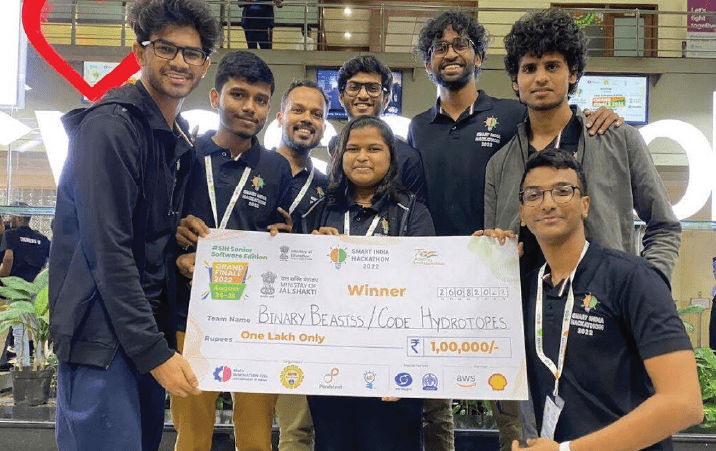Students from Bengaluru’s CMR Institute of Technology (CMRIT) were among the winners at the finale of Smart India Hackathon (SIH) 2022 held in Mumbai on August 25 and 26 for developing a website and a mobile application that suggest crops for a particular season based on water availability. They won the prize for their solution for the problem statement ‘water availability-based crop-specific advisory’ that was given by the Central Water Commission (CWC), Union Ministry of Jal Shakti.
The SIH is a nationwide initiative by the Union Ministry of Education to provide students with a platform to solve some of the pressing problems in daily life and inculcate a culture of product innovation.
The winning team was called Code Hydrotopes and led by Vaibhav B. The other members of the team were Louise Patra, Manisha Kumari, Mohnish Kamalaksha, Devadathan Menon and Adithya Anbazhagan, who all belong to either the electrical or computer science engineering streams. The team was mentored by Dr Sharmila KP, Dr Adarsh Rag S and Pratik Mukesh Bharuka.
Vaibhav said that the team focussed on India’s growing water crisis as a result of exploited farming methods and depleted groundwater levels which are also leading to low crop productivity.
The application created by Code Hydrotopes suggests planting various other crops instead of conventional crops so that farmers can minimise the risks of low productivity and loss in their venture.
Vaibhav said: “We created an algorithm called ARIMA that analyses monsoon and pre-monsoon showers in every taluk of India. Based on this analysis, the application predicts groundwater availability, suggests crops, analyses soil fertility and provides minimum support price (MSP) rates which will help farmers produce the right crops. Moreover, this application targets only tech-savvy farmers who can understand the use of digital technologies. A farmer has to enter the taluk he belongs to and the data is presented before him in the form of pie charts, graphs and other tools.”
Vaibhav added that the team also used a ‘selenium’ bot which allows downloading various data such as details on pre-monsoon, MSP, groundwater level, soil pH (potential of hydrogen) – automatically from government websites. The team predominantly used data from government websites, including Central Ground Water Board (CGWB), India Water Resources Information System (IWARIS) and Soil Health to understand the types of crops and water availability, among other factors.
The students said they worked on the project for at least a month while balancing between it and their internal examinations. “This was the first opportunity on a national level platform and it was a great learning experience. We had to balance our internal examination and also work on the ideation and implementation part of the solution. The challenging aspect, however, was to present the solution to the judges and explain it in layman’s terms. The competition also gave us more scope to work and improvise the solution further,” said Kumari, one of the winners.
Nearly 2,000 out of 30,000 teams were selected for the SIH 2022 grand finale. Among the five teams selected from the CMRIT, three were software teams and two hardware teams. Team Code Hydrotopes participated in the event at Welingkar Institute of Management Development and Research (We School), one of the 75 nodal centres.
Courtesy : The Indian Express
